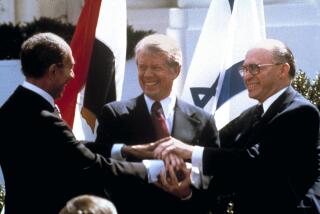Subverting the Peace Subversives : Mubarak shows the way in anti-radical effort
- Share via
Egypt, even as it tries to cope with Islamic fundamentalist-inspired violence at home, has taken the lead in seeking to persuade other Arab states to stop bickering with each other, concomitant to bringing the long Arab-Israeli conflict to an end. Its efforts deserve Washington’s broad support.
Egypt made its own peace with Israel almost 15 years ago. It may soon have company. The Sept. 13 agreement between Israel and the Palestine Liberation Organization has been taken by a number of Arab countries as granting permission for a warming of their own relations with Israel. Morocco and Tunisia seem close to formalizing ties with Israel. Islamic but non-Arab Indonesia has also signaled a change in attitude. Of most immediate importance, Jordan stands ready to sign a peace agreement; only its concern over getting too far ahead of other Arab parties restrains it. This point figured prominently in the Cairo talks held this week between King Hussein and Egypt’s President Hosni Mubarak.
Those talks were first of all an occasion for reconciliation between two countries that were on opposite political sides in the Persian Gulf War. Egypt was a major Arab contributor to the U.S.-led coalition that liberated Kuwait. Jordan, sympathetic to Iraq’s aggression, opposed allied intervention. By moving to close his own rift with Jordan, Mubarak has bolstered his credentials to act as a mediator in trying to resolve differences over the peace process among other Arab states.
Syria, of course, remains the key problem. Fearful of a peace that would undercut his claimed need to maintain a repressive regime at home, President Hafez Assad continues to insist on Arab solidarity in negotiations with Israel. But the demand for a united Arab front, which inevitably lets radicals veto any bid to make productive changes in the status quo, was a major reason for decades of inertia in Arab-Israeli relations, and a major reason why PLO Chairman Yasser Arafat finally decided to act unilaterally. Jordan would prefer Syria’s committed involvement in the peace process. But the hints from the Cairo meeting were that Jordan, which is under pressure from Washington to get on with peacemaking, might not wait much longer for Syria to join up.
The more Arab and Islamic states that line up in favor of normalizing relations with Israel, the more isolated and outmaneuvered both Arab and Israeli anti-peace extremists will find themselves. The Israeli-Palestinian violence of the last few days is only the latest evidence of how volatile the situation remains. Broad-based progress on the peace front is the most effective response to those who aim to subvert the peace process.
More to Read
Sign up for Essential California
The most important California stories and recommendations in your inbox every morning.
You may occasionally receive promotional content from the Los Angeles Times.










